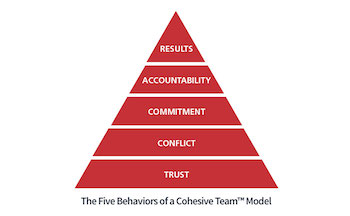Are you feeling some fatigue from all the stories that urgently and breathlessly write about how the pandemic and remote work are changing EVERYTHING? Some issues become so trendy that the impulse to relate them to every aspect of leadership and organizational behavior seems irresistible. So here’s a basic, but vital question to consider…
…How is your team performing?
Teams are crucial to getting work accomplished. Period. According to a recent survey by Wiley Publishing, workers spend 60% of their time on teams. No matter the situation or work environment, can you think of a genuine leader who succeeds or an organization that thrives without people working together effectively toward some common purpose? No! Without strong, productive teams, you and your organization will stumble.
The Five Elements of a High Performance Team
Based on the work of Patrick Lencioni and the Five Behaviors of a Cohesive Team,™ there are five essential behaviors required in all strong, high performing teams. Each builds on the other, pyramid-style:

Take a moment and assess the five elements that constitute a healthy, high performing team. List your team’s strengths and challenges — which list is longer? Then, identify one change that might significantly improve your team’s performance for each element. Don’t be afraid to think big, but identify some changes that will help in the short term too.
TRUST
Beyond trusting that your teammates will complete their assignments on time or follow-up on tasks as promised, teams need what Lencioni refers to as “vulnerability-based” trust. It calls for everyone on the team to be open and honest with each other. When that happens the team creates a safe environment to:
- Say that you don’t know the answer to a question
- Admit that you made a mistake
- Talk about why you think one idea is stronger than another
- Offer sincere feedback
A survey conducted by Wiley Publishing reports that 61% of teams say they lack trust. For greater detail about vulnerability-based trust, read Arden Coaching’s blog series, “Essentials of Team Performance: Trust.”
- In two columns, list your team’s strengths and challenges in this area. Which list is longer?
- Identify just one area to target to make a significant impact here.
- Using a SMART goal approach, create a plan to enhance this behavior on your team.
(HEALTHY) CONFLICT
“Conflict” does not mean argument or hostility — toxic disagreement that is hurtful and mean-spirited. Healthy conflict is honest debate. It is productive and moves the team forward. Healthy conflict is the ability to openly and genuinely discuss ideas, issues, and actions. The merits of ideas, recommendations, and actions are debated — not the people who brought an idea to the table. The best idea wins! And everyone on the team participates. The ability to engage in healthy conflict is built on a foundation of vulnerability-based trust.
Fhttps://ardencoaching.com/essentials-of-team-peror more information about healthy conflict, read “Essentials of Team Performance: Healthy Conflict.”
- In two columns, list your team’s strengths and challenges in this area. Which list is longer?
- Identify just one area to target to make a significant impact here.
- Using a SMART goal approach, create a plan to enhance this behavior on your team.
COMMITMENT
To move forward, teams are constantly making decisions, big and small. As these decisions are made, team members on cohesive teams stand by those decisions. Commitment means that team members understand and agree to support team recommendations and decisions — unqualified buy-in from each team member. Commitment is not consensus! Remember, the best idea wins. Commitment happens when the team’s leader chooses the best course of action possible and the team gets behind the decision whole-heartedly.
For a deeper dive about commitment, read “Essentials of Team Performance: Commitment.”
- In two columns, list your team’s strengths and challenges in this area. Which list is longer?
- Identify just one area to target to make a significant impact here.
- Using a SMART goal approach, create a plan to enhance this behavior on your team.
ACCOUNTABILITY
Accountability is all about taking responsibility for making sure that everyone keeps their promises. For a cohesive team, this means that team members — not just the team leader or the boss — must actively hold each other accountable for their work and their behavior.
Accountability for team behavior is vitally important. While we all dislike holding others accountable, holding someone to account for delivering project updates on time is fairly easy compared to addressing behaviors. But it is critical for team members to hold each other accountable for their behaviors as well as their work product.
Wiley Publishing’s survey found that 80% of teams say they are not holding each other accountable! For more information about accountability, read “Essentials of Team Performance: Accountability.”
- In two columns, list your team’s strengths and challenges in this area. Which list is longer?
- Identify just one area to target to make a significant impact here.
- Using a SMART goal approach, create a plan to enhance this behavior on your team.
RESULTS
Of course, the work of any team is to deliver desired results! However, high performing cohesive teams view results in a very specific way. They seek collective, team-based results, not individual results.
Based on the other four elements of a cohesive team, great teams are not driven by personal ego, or departmental needs and budgets. They are focused on collective team results — decisions should be in the best interest of the team and the team goal or objective. The old cliche, “There is no ‘I’ in TEAM,” is spot on. Teams need to work diligently to make sure that everyone is doing their best to help the team accomplish its goals.
For greater detail about results, read Arden Coaching’s blog series, “Essentials of Team Performance: Results.”
- In two columns, list your team’s strengths and challenges in this area. Which list is longer?
- Identify just one area to target to make a significant impact here.
- Using a SMART goal approach, create a plan to enhance this behavior on your team.
To learn more about developing high performance teams and improving your leadership skills, contact Arden Coaching at info@ardencoaching.com or 646.684.3777.

